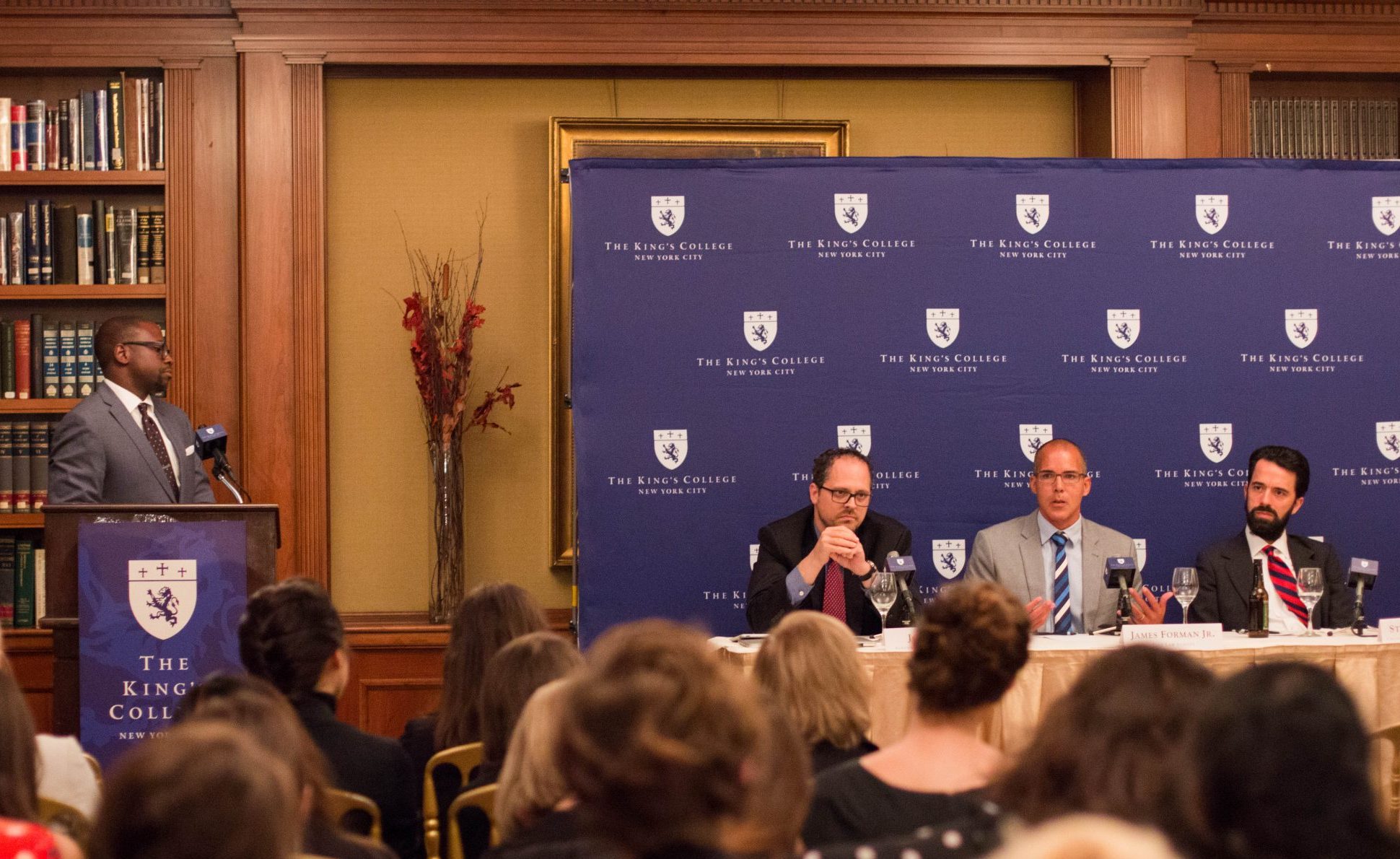Overcriminalization and Mass Incarceration: Race and Justice Beyond the New Jim Crow
On Thursday, September 29, 2016, the Center for the Study of Human Flourishing at The King’s College hosted a special event, “Overcriminalization and Mass Incarceration: Race and Justice Beyond the New Jim Crow,” at the Princeton Club in midtown Manhattan.

On Thursday, September 29, 2016, the Center for the Study of Human Flourishing at The King’s College hosted a special event, “Overcriminalization and Mass Incarceration: Race and Justice Beyond the New Jim Crow,” at the Princeton Club in midtown Manhattan.
The event featured a panel of distinguished criminal-justice experts— Stephanos Bibas, a professor of law and criminology at the University of Pennsylvania Law School; James Forman, Jr., a clinical professor of law at Yale Law School; and Dr. John Pfaff, a professor of law at Fordham University Law School. It was moderated by Dr. Anthony Bradley, associate professor of religious studies at The King’s College.
The event opened with a reception, and then Bradley introduced the evening’s topic. Bradley challenged the notion that the War on Drugs is mostly to blame for the 2.3 million women and men incarcerated in America, an argument presented by legal scholar Michelle Alexander in her 2010 book The New Jim Crow: Mass Incarceration in an Age of Color Blindness.“There’s more to the story of mass incarceration than drug policy and racial discrimination,” said Bradley. “Prisons are not churches,” he said, and “should be used because people are dangers to society, not because we are mad at them.” He then introduced the evening’s guests, each of whom offered short remarks about the problems of mass incarceration and offered possible solutions.
First, Pfaff—who researches empirical matters related to criminal justice, particularly criminal sentencing—offered remarks. “However bad you think things are,” he began, “they are far, far worse.” He went on to challenge three common narratives that are used to explain the rise of the prison population: the War on Drugs, longer sentences, and the private prison industrial complex. According to a recent poll conducted by Vox, Pfaff said, 60 percent of Americans think that mass incarceration is due to drug crimes. Actually, violence is to blame, he said, citing the statistic that 52 percent of those in state prisons are there for violent crimes. Pfaff also said that it is more likely that overzealous prosecutors are to blame for the rise in the prison population than longer sentences and that “insidious” forces such as unions protecting the interests of public prison guards are more to blame than the private prison industrial complex.
Next, Forman—whose interests focus on the race and class dimensions of schools, prisons, and police—shared remarks addressing the question of how we combat 40 years of a punitive criminal-justice system. Forman argued that there are deep moral problems involved with incarceration and that we do not treat individual cases with nuance, ignoring the “back story” and “life history” of offenders and quickly labeling them as criminals. Forman shared the story of one of his former clients, Dante, a 16-year-old who committed a robbery in Washington, D.C. as part of gang initiation. Forman said that Dante’s life was changed because his victim was supportive of his being sentenced to an alternative program rather than prison. “What if we tried to restore communities and rebuild relationships?” Forman asked, suggesting that our society implement solutions such as drug treatment and welcoming ex-prisoners back into our communities. Forman concluded that he believes that it will be a “combination of these individual decisions as well as policy decisions” that will bring about change.
Lastly, Bibas—who studies the incentives influencing prosecutors, defense counsel, defendants, and judges—offered remarks. Conservatives should support criminal justice reform, he argued, because “criminal justice is big government” and “we should expect [those involved in the criminal justice system] to serve their own interests.” Bibas said that there are ways that we can punish offenders “without disrupting other things we care about, like families and communities.” Historically, Bibas said, Americans had an attitude of “There but by the grace of God go I” toward criminals, but today, we treat criminals as disposable citizens. Prisons, he said, act as “warehouses for people we threw away.” Bibas offered several possible solutions for the problems of mass incarceration including reducing drug use by monitoring (as Hawaii’s HOPE program does), tracking offenders with GPS rather than keeping them in jail as they await trial, and connecting ex-prisoners with people in local faith communities to ease the burden of reentry.
Following their remarks, the panelists answered questions from the audience. Questions touched on the Brock Turner rape case, work programs within prisons, the rehabilitative purpose of punishment, and the ethics of solitary confinement. The event concluded with a reception, and the room buzzed with attendees—from King’s, Columbia, NYU, and the general public—discussing the panelists’ arguments. “Overcriminalization and mass incarceration are two of the most important justice issues of our generation,” said Bradley, “and The King’s College is delighted to partner with leading legal scholars at schools like Fordham, Yale, and Penn for events like this to raise awareness and propose effective solutions at the national level.”
Watch the full event on Youtube.
For more than 75 years, The King’s College has educated young leaders to integrate their faith, ethics, and morality seamlessly into their lives and careers. The only traditional Christian liberal arts college or university located in the heart of New York City, King’s prepares students for principled leadership around the world. Visit tkc.edu for more information or request a personalized visit by calling 888-969-7200




